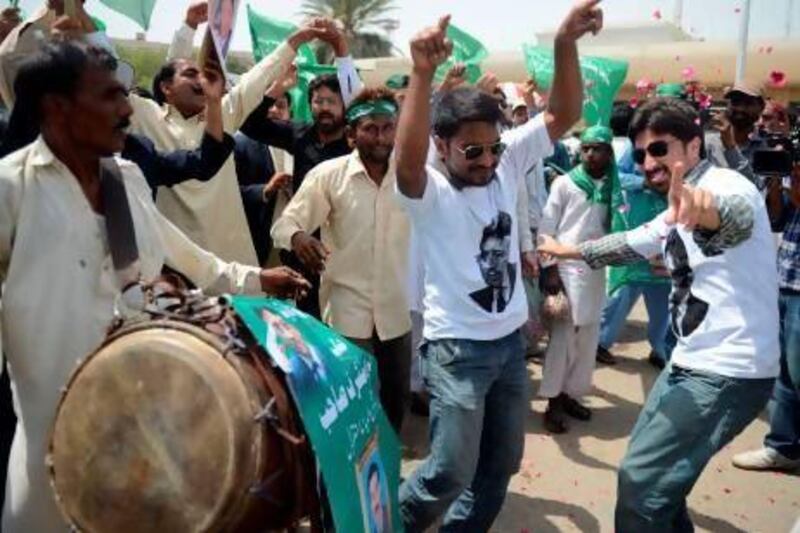KARACHI, Pakistan // Former president Pervez Musharraf returned to Pakistan yesterday after more than four years in exile, seeking a possible political comeback in defiance of judicial probes and death threats from Taliban militants.
The journey from Dubai to the southern port city of Karachi was intended as the first step in his goal of rebuilding his image after years on the political margins. But the former military strongman was met by no more than a couple of thousand people at the airport- a small turnout by the standards of Pakistani politics and a testament to how much his support in the country has fallen since he was pushed from power in 2008.
"We have just landed at Karachi and there are a lot of people here", Mr Musharraf's media aide, Khurram Haris, told The National by phone a few minutes after the plane arrived.
"We are still going through the airport and it is very busy."
Mr Musharraf struck a defiant tone when he spoke to his supporters outside the airport, saying he had proved those people wrong who said he would never return after he failed to follow through on previous promises. He also said he was not cowed by a threat by the Pakistani Taliban to kill him.
"I'm not scared. I'm only afraid of God," he told his supporters. "For the sake of my country, wherever I need to go, I will go."
Since the former general stepped down in the face of mounting discontent, Pakistan's civilian leadership has struggled with a sinking economy, resilient Islamic extremist factions and tensions with Washington over drone strikes and the May 2011 raid that killed Osama bin Laden.
Mr Musharraf, who seized power in 1999, represents a polarising force that could further complicate Pakistan's attempt to hold parliamentary elections in May and stage its first transition from one civilian government to another.
He is viewed as an enemy by many Islamic militants and others for his decision to side with the United States in the response to the September 11 terrorist attacks. On Saturday, the Pakistani Taliban vowed to mobilise death squads to send Mr Musharraf "to hell" if he returns.
Mr Musharraf's supporters, including elements of the military and members of Pakistan's influential expatriate communities, consider him a strong leader whose voice - even just in parliament - could help stabilise the country.
He faces legal charges, including some originating from the investigation of the 2007 assassination of former prime minister Benazir Bhutto, who also spent time in self-imposed exile in Dubai before returning.
The flight from Dubai came after several failed promises to return in recent years. Mr Musharraf announced in early March that he would lead his party, the All Pakistan Muslim League, in the May elections.
Mr Musharraf met briefly with reporters in Dubai before heading to the airport.
He mingled with supporters aboard the plane on the way to Karachi, as some of them chanted slogans for his party, and tweeted "Finally I am coming home. Pakistan First!" as the plane approached Karachi.
There were moments of tension among his supporters when security forces whisked him away in a convoy of about a dozen vehicles, raising concerns he was being detained. It turned out he was simply being shifted to a different terminal, and his supporters had to wait more than two hours before he came out to address them.
The former president plans to spend a few days at a hotel in Karachi, where he and his team will hash out their plan for the upcoming election, said spokeswoman Saima Ali Dada. He will then travel to Islamabad. Meanwhile, his legal team will meet to decide the best way to respond to the charges against him.
"He is hoping for the best," said Ms Dada.
Mr Musharraf was forced out of office in 2008 amid growing discontent over his rule and the threat of impeachment by the country's two most powerful political parties. He has since lived in Dubai and London.
His decision to return was given a boost last week when a Pakistani court granted him pre-emptive bail - essentially preventing his immediate arrest - in three cases in which he is implicated. Besides Bhutto's death, he also faces charges related to the killing of Akbar Bugti, a Baluch nationalist leader, in August 2006 after a standoff with the Pakistani military, and is accused of illegally removing judges including the chief justice of the supreme court.
Mr Musharraf now has 10 days to appear in court. He has dismissed the various charges as baseless.
Mr Musharraf on Saturday received death threats in a video message posted online by Adnan Rasheed, a militant who was among 385 inmates freed when Taliban fighters stormed a Pakistani jail last April, and who has tried before to assassinate the former president.
"The mujahideen of Islam have prepared a death squad to send Pervez Musharraf to hell," Rasheed said in the video. "We warn you to surrender yourself to us. Otherwise we will hit you from where you will never reckon."
Mr Musharraf had been expected to address a gathering yesterday near the mausoleum of Pakistan's founding father Mohammed Ali Jinnah in Karachi. But police decided to cancel his permit because of a "very serious threat," said Tahir Naveed, the deputy inspector general of Karachi police. He said Mr Musharraf would be provided with an armoured vehicle to protect him.
Militants tried to kill Mr Musharraf twice in December 2003 in Rawalpindi, where the Pakistani military is headquartered. First they placed a bomb intended to go off when his convoy passed by. When that did not work, suicide attackers tried to ram his motorcade with explosives-laden vehicles. The president was unhurt but 16 others died.
* With reporting from Nadeem Hanif in Dubai





